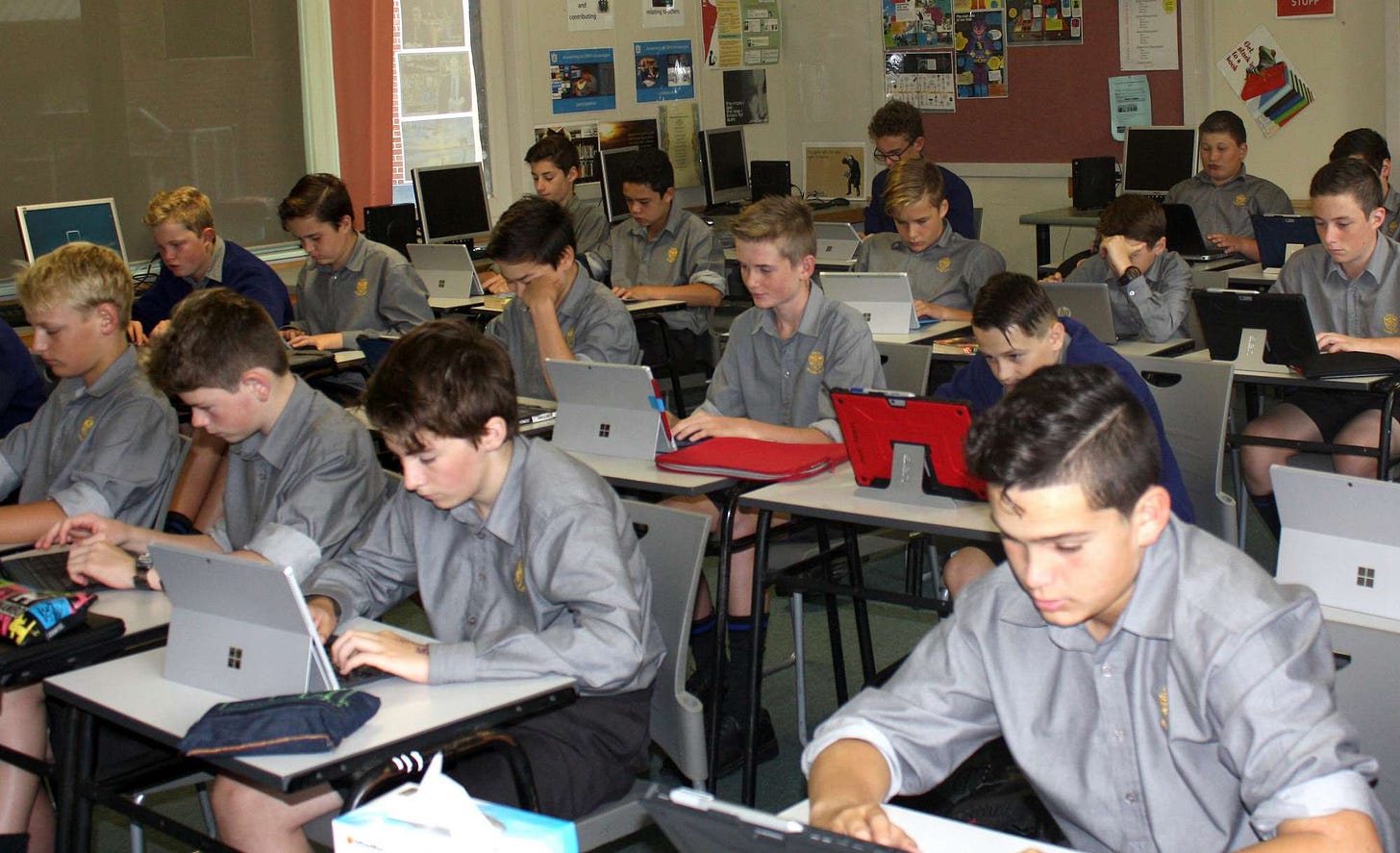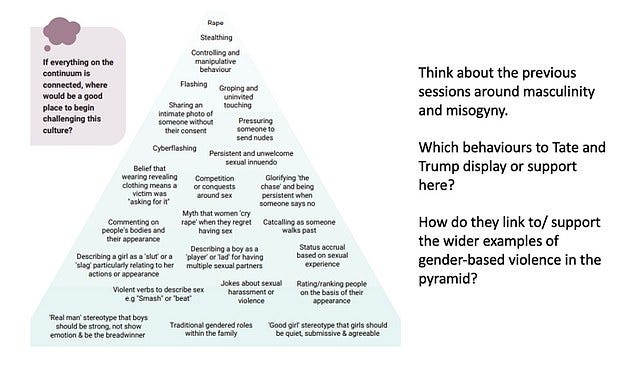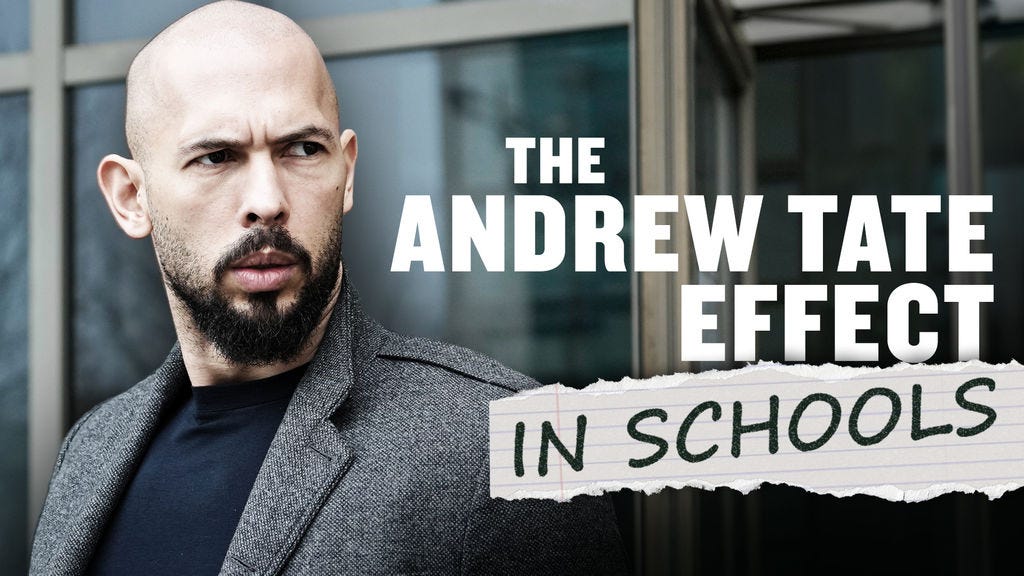Feminist teaching encourages boys as young as 11 years old to hate themselves (and women)
Reports from the UK and Australia reveal anti-male bias and boys’ resistance
For years, feminists in the English-speaking school systems have done everything they can to psychologically destroy a generation of boys, calling their masculinity “problematic,” “hegemonic” and “toxic.”
At their least malign, feminist teachers have made it clear to boys that their perspectives and experiences aren’t as important as those of girls. Many businesses and organizations support programs aimed at girls’ academic success; there are no equivalent programs for boys. When study after study shows boys lagging behind girls in school, many feminists don’t even pretend to care, blaming the boys, as did Australian feminist Jane Caro, for their alleged privilege. Such ideologues continue to call for more feminist teaching, and moreover take direct aim at schoolboys’ maleness in what scholar Paul Nathanson has identified as a form of identity harassment, a pervasive psychological assault that creates doubt, shame, and alienation.
Under the feminist model, boys learn from a young age that their sex is responsible for violence and other serious harms, and that they must take personal responsibility for it. A few years ago, it came to light that the female principal of an Australian school thought it a good idea to hold an assembly in which the boys were to apologize for male misbehavior to the girl next to them. Naturally, no girls are ever expected to apologize to boys for the misdeeds of the female sex.
Calls regularly circulate, as in the West Australian’s “How We Stop This Kid Becoming a Monster,” for teaching to address the problem of predatory masculinity. Unless the feminist deprogrammers can get to work in the early years, we’re told, the boys will succumb to their inner monster. Boys learn that they can hurt girls and women even without meaning to, just by looking at them or holding traditional views. As we’ll see, any boy who objects to his own vilification will learn that objecting itself is a technique of domination.
Teaching Toxic Masculinity
A recent report on UK schools provided a glimpse into what feminist instruction looks like, revealing that terms such as “hegemonic masculinity” and “toxic masculinity,” until a decade ago part of the radical feminist fringe, are now in the mainstream of pedagogy even in the lower grades.
The Family Education Trust surveyed materials used by UK schools in their sex education classes. Out of 197 schools that responded to a request for information (more than 100 did not respond), 62 schools confirmed that they were teaching about toxic masculinity. 10 schools even admitted to teaching that “men and boys possess traits that are inherently toxic and negative for society.” (One would be relieved to hear that the principals of such schools and all participating teachers were immediately sanctioned, or at least told to stop such claptrap—but of course such has not occurred.)
One slide from a lesson on toxic masculinity stated that while “masculinity in and of itself is not necessarily a harmful thing […] the way that masculinity is traditionally defined in society can be problematic.” Some of the materials don’t even make sense, as for example the statement that traditional masculine traits “can be limiting for women, girls and other people who don’t identify as men, who are not expected to display these traits.”
The material is staggering in its crude and dishonest use of baseless feminist theories, which are taught not as controversial and ideological, but as straightforward depictions of reality. One slide distinguishes (confusingly) between toxic masculinity and misogyny, informing students that toxic masculinity involves “Telling someone to ‘Man up’” (but wasn’t there a whole feminist anti-violence campaign using that slogan?!!) while misogyny includes “Expecting women to make you a sandwich,” “Being disgusted by women’s body hair but ok with men’s,” and “Thinking women are too emotional to be good leaders” (more on women’s emotionality later). In a society allegedly rampant with misogynistic violence, one is struck by the triviality of the examples.
The crowning glory is perhaps the rape culture pyramid (above), which itemizes beliefs and practices that allegedly promote sexual violence. These include “traditional gendered roles within the family,” “jokes about sexual harassment or violence” and “describing a girl as a slut or slag.” A discussion question asks, “If everything on the continuum is connected, where would be a good place to begin challenging this culture?” and, almost incredibly, “Which behaviors do Tate and Trump display or support here?” According to classical conceptions of rhetoric and logic, both questions are fallacious in assuming answers allegedly sought (they assume, for example, that everything in the pyramid is connected to rape; and that there is something called rape culture that Tate and Trump promote).
In addition to the injury to male students’ dignity, the circular reasoning is embarrassingly simplistic and authoritarian.
If one wanted to create resentment and a strong sense of unfair treatment, such teaching materials are precisely how it would be done. The report is based on the UK system, but one can assume that similar materials are being used elsewhere in the Anglophone world.
Who can be surprised if some boys act out?
Now, a new report out of Australia by three feminist academics from Monash University (“The problem of anti-feminist ‘manfluencer’ Andrew Tate in Australian schools: women teachers’ experiences of resurgent male supremacy”) shows that some boys are rejecting feminist indoctrination, and that their feminist teachers are desperate to silence them (see Tom Golden’s lucid discussion of the report here). Many of the teachers surveyed, in fact, are so upset by the boys’ dissent that they interpret it as a personal attack on them as women. Short on evidence and long on anti-male theorizing, the report makes clear that feminist teachers are at best ill-equipped to deal with boys and young men in the classroom.
Part of a two-year project funded by Australia’s National Research Organization for Women’s Safety, the report claims, based on anecdotal evidence, to identify an increase in classroom misogyny following the rise of social media star Andrew Tate. Report authors Stephanie Wescott, Steven Roberts, and Xuenan Zhao, all from the Faculty of Education, vilify boys who demur from feminist propaganda, alleging that their expressed rejection is a means to “enact dominance over women.” They charge the boys with “luring teachers into discussions where their value as women is challenged” (no examples given) and “tak[ing] the opportunity to assert their right to speak freely.”
In a reversal typical of feminist practice, the adult women who subject boys to anti-male propaganda are presented as the powerless victims of the boys, some of whom are as young as 11 and 12 years old. Condemning the boys for their “reluctance to identify themselves accurately as economically and socially privileged,” the report authorizes further measures to muzzle and marginalize them: “School-level responses must be broader and more comprehensive and proportionate to the level of distress experienced by teachers working with boys.”
Though accompanied by considerable press fanfare, the report is an insubstantial and amateurish production, employing a small sample of interview subjects and a fatally biased methodology. Only 30 teachers, all female, were interviewed from across Australia. They were not randomly chosen but were recruited through “existing professional networks and via a flyer shared widely on Twitter, Facebook and Instagram.” In other words, the subjects came forward of their own accord, likely because they had stories of misogyny to share. At least two of the 30 respondents, “Melissa” and “Melanie,” have already quit teaching as a result of stress. No male control group was established to explore whether male teachers had similar (or different) problems; or indeed, were more successful in earning their pupils’ respect.
In a study keen to show evidence of a “regressive male supremacy” apparently reinvigorated by Andrew Tate, the accounts are notably mild and vague. Many boys reportedly expressed a liking for Tate, or at least an interest in him, without any accompanying anti-woman sentiments. “They didn’t really say any specifics,” explained one teacher disapprovingly, “just how much they loved him. And they know in a way that he was bad, but it was a funny thing to like him.” Some of the teachers were disturbed that the boys would mention Tate in a joking manner or express the belief that he was not guilty of the charges brought against him. Other teachers noted that the boys “expressed admiration for Tate’s overt and exorbitant wealth.” Another teacher summarized Tate’s (allegedly male supremacist) appeal as “You deserve respect, you deserve someone to look after you.” Only a feminist ideologue, one suspects, could be very disturbed by such banal findings.
Many of the teachers seemed frustrated to feel themselves judged by the boys as inadequate. One teacher didn’t like that boys “demand[ed] feedback” in the classroom and said things like “Explain what you mean.” This same teacher expressed her belief that “There are demands on women’s labor, time and expertise […] that are not the same as those made of men who work in the same school.” Perhaps the men were more skilled, more empathetic, less defensive?
Another teacher noted an attitude of disrespect from the boys, who would reportedly put their feet up on the furniture or “get up and walk out of the classroom.” It’s not clear how often these things happened. One teacher was irritated at having to learn “how to have a more constructive conversation without me having to actually defend myself against Andrew Tate to a 15-year-old boy.” It is difficult to determine whether these examples demonstrate severe disrespect and dislike (not necessarily misogynistic or even unusual) or whether they simply showcased the boys’ unwillingness to be told what to think and like. Many of the teachers interviewed seemed to think they should be able to make sweeping pronouncements about Tate or “masculine hegemony” without having to defend the statements.
Notably, the respondents tended to characterize any resistance to feminism or female power as evidence of hatred even when no hatred was expressed. One English teacher complained that some boys disliked feminist literature, asking “Why do we have to read this myth?” or saying in response to a feminist poem, “Oh, it’s not that bad.” One young man allegedly “confessed to hating women” when he claimed that “Women suck […].”
One teacher “described slurs like ‘slut’ being uttered aloud in class with increasing frequency and indifference to potential consequences, and boys using silencing comments such as ‘shut your mouth’ to girls in their classrooms.” Another teacher listed a “shopping list of horrific things” that went on behind her back, including “fat shaming, name calling, slut shaming, [and] physical and verbal abuse.” Did girls ever make derogatory comments about boys? Were boys shamed about their bodies or told to shut their mouths? Were these comments made while “male supremacy and sexism” were being discussed in the classroom? Without context, it is difficult to assess the meaning and intention of the boys’ reported statements.
The most egregious few examples, saved for last in the report, were all supplied by a single teacher, “Sarah,” who described herself as the victim of misogyny. One boy, reportedly hostile all year, ultimately engaged in what the report calls “violence”: “He ended up, um, spitting in my water bottle,” Sarah revealed. She also recalled a student saying “Miss, your boobs look really big today.” At other times, she alleged, “You just hear them talking behind your back about you and what you are wearing.” Given that no other teacher reported any form of “violence” or overt personal harassment of this nature, it is hard to judge whether such admittedly rude behavior was common.
And that’s the extent of it. Boys joking about Andrew Tate, wanting to argue, telling girls to shut their mouths, and expressing distaste for feminist literature. Despite the academics’ repeated claims, it is not clear from the report that misogyny and male supremacism are rampant in Australian classrooms, or even present at all. What is clear is that the report authors, and many of the teachers interviewed, do not like boys or have the ability to relate to them. They have no sympathy for them and no interest in understanding their perspectives. When the one boy said that “Women suck,” for example, did his teacher ask him why? Did she want to know what was in his mind? Not a single teacher interviewed expressed interest in exploring the boys’ points of view.
The report used dehumanizing language to discuss male students and valorized the teachers’ dehumanization of them. We are told that male students display “a growing sense of brazen, remorseless entitlement,” though how that mindset could be definitively known is never explained. One teacher talked about how a boy she had first encountered and liked as a “wholesome creative” was now unrecognizable to her because he had said, “No, Andrew Tate is being vilified. He’s in the right.” Her response: “I’m like, who is that boy?” Offended by the boy’s defense of Tate, this teacher admitted to losing empathy for him. Why was she so personally bothered? Why do these women’s feelings matter more than their pupils’ expressed needs and assertions? If ever a case were to be made for all-male schools and all-male teaching staff, this document could be a primary exhibit.
In my opinion, none of the teachers interviewed have what it takes to be competent teachers. Their comments suggest that they are self-obsessed, ideologically driven, and emotionally fragile.
Conclusion: When feminism backfires, we need more feminism
The report partakes of the circular logic of much feminist advocacy. We are to understand that after years of feminist teaching, there has been no diminishment of misogynistic attitudes. On the contrary, misogynistic attitudes are on the rise. Shouldn’t such a result raise urgent questions about the efficacy of the teaching? Does no one consider that the feminist ideology may be the problem, not the boys? (And why is it thought appropriate or necessary to tell 11 year old boys what they should think about Andrew Tate in the first place? Are there not enough real subjects to be taught?) The all-too-predictable conclusion of the report is that more feminist teaching should be implemented. “Reflecting on the findings, we suggest the need for open conversations in schools to allow women to disclose their experiences and to invite dialogue about the influence of the manosphere on boys’ developing identities and relationships.”
It used to be said that the definition of insanity was doing the same thing over and over again while expecting different results. But likely different results are not actually expected, or even desired.
Though feminists like to speak about respectful relationships, there is nothing respectful in telling boys that their masculinity is “problematic” or in assessing their propensity to rape. There is nothing respectful about dictating, without question or argument allowed, the ideological postulates that boys and young men are to accept.
Feminist power, as these teachers reveal it, cannot even recognize the humanity of children made uncomfortable by their authoritarianism. Feminism has no more place in our schools than any other extremist ideology.










Darn it! Anybody have a screen shot of that hateful feminist screed? It was a classic.
“Toxic masculinity”, until a woman does it, then it’s “empowerment” or “confidence”.
My teenager is starting to see first hand in high school how conniving and downright mean some of the female classmates can be. I wish I could tell him they’ll grow out of it, but I know from experience that’s not always the case. Funny how the worst of the mean girls went on to be teachers, I feel like that’s relevant to point out after reading this.